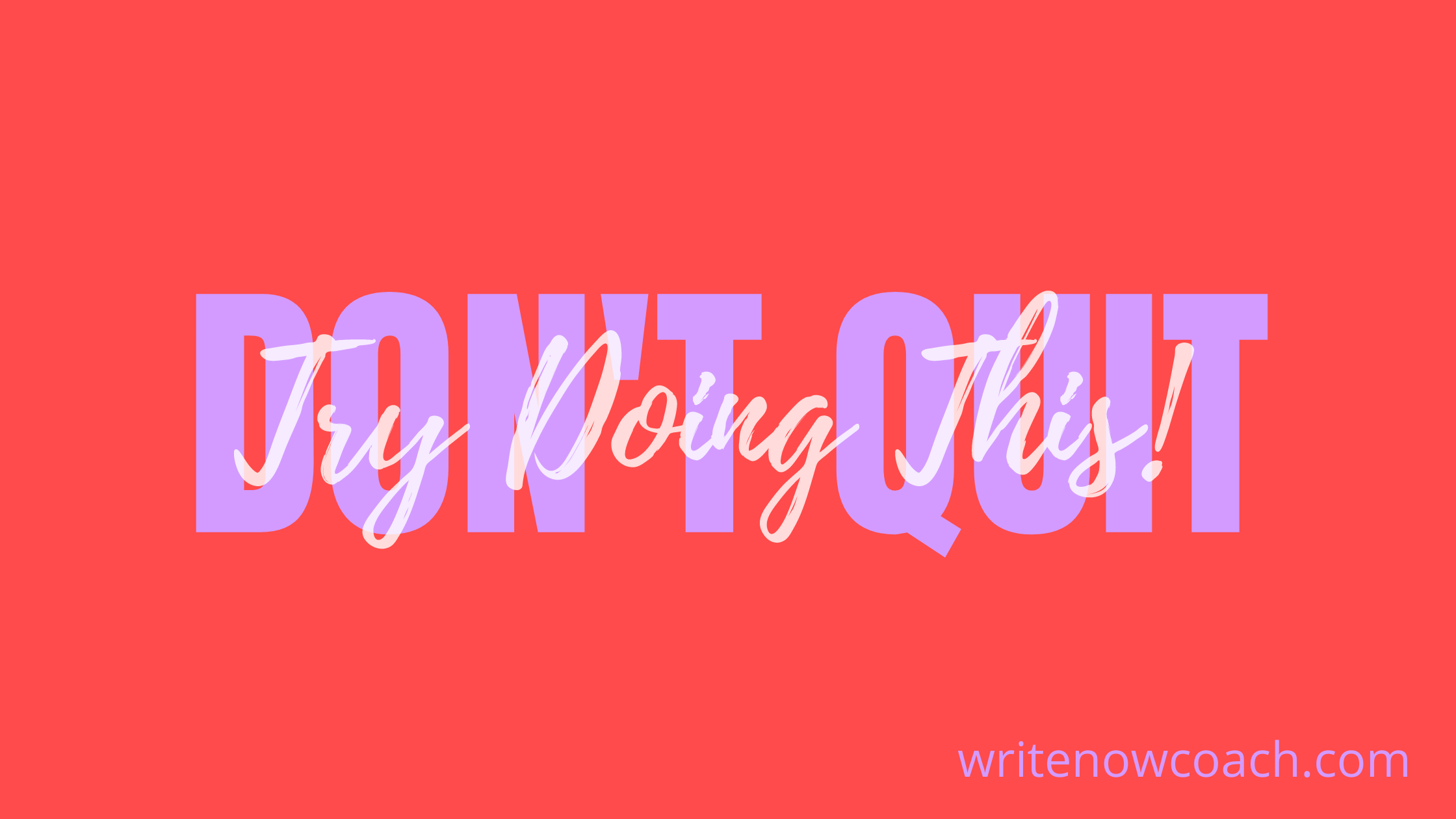Thinking of Quitting? Do This Instead
September 1, 2020
Note From Rochelle
Dear Writers,
Do you ever feel like ditching the whole writing business and taking up a new profession? Read today’s tip first. You’ll find oodles of things to do besides quitting!
Enjoy!
Rochelle

Thinking of Quitting? Do This Instead
by Rochelle Melander
The best way out is always through. —Robert Frost
Do you have stacks of unfinished projects hiding on your computer? Do you see a story online and think, “I wrote an article on that years ago—I just never finished it.” Are you contemplating quitting writing?
We all have moments when we want to give up on a project or quit writing. Last week, I asked a client to develop a list of things to do instead of quitting. I told them I’d do the same.
Why?
Because when we get stuck or rejected or simply tired of trying harder, it’s tempting to give up. Don’t. Do one of these things instead:
Consider your purpose
Look back at why you want to write in the first place. How does your writing help you? How does it change you? In what ways do you hope it will help others?
Consider your project’s purpose
Years ago, I heard Meg Wolitzer say that when she got stuck, she would ask two questions:
What was I trying to do with this book?
What should I do now?
Brainstorm solutions
Look at where you are stuck in the project or the process, and ask questions. Maybe you have no idea what the characters in your current story need to do next. Or you’ve sent your proposal to 35 agents and received 35 rejections. Choose a question (Why? What if? How? I wonder if?). Set your timer for 10 minutes and answer the question in as many crazy ways as you can.
Challenge the structure
Ask, “Could I write this if I structured it as a . . .” and then give yourself several options. Look at examples of books or stories in your genre that do it well and note the structure. How can you borrow their structures to make your piece work better?
Let your characters talk
When Marlon James began writing, A Brief History of Seven Killings, he told the story through the eyes of an American hit man. When he got stuck, he started over from another character’s point of view. In the end, he chose to tell the story through many narrators. You may not end up at the same place, but writing from another character’s point of view or interviewing your characters might help you find a way forward.
Write sideways
Instead of pushing yourself to write forward on your project, work on backstory, setting, or research. Skip a scene or two and write that. If you’re writing a nonfiction book, write the back matter or a different section. Just keep writing.
Read
Writers read. When you get stuck and feel like quitting, it can be hard to look at the work of those who’ve succeeded. (Check out my post on dealing with envy.) But reading stories that have sold can teach you how to tell a better story.
Journal
Keep a journal about the work or process that’s frustrating you. Use it to write ideas, notes, and questions about your work. Or, use it to list everything that you are curious about. If it’s too daunting to write about your writing, write about what you’re grateful for or what makes you laugh or what you’re curious about or the people who annoy you. Just write.
Start a new piece
Sometimes the way to avoid quitting writing is to quit working on the current project and write something new. Delving into a new piece can spark our energy for writing again.

Fill the well
Sometimes “I want to quit” is really “I’m so tired.” What we need is a break to fill our well. But watching bad television and surfing on social media won’t help us—we’ll just end up feeling more tired. Consider what helps you feel refreshed. For many people, it’s walking in nature; listening to or viewing art; or doing something creative, like gardening or cooking. Immerse yourself in joyful, restorative practices.
Get help
We cannot always see what’s not working with our writing or our process. A critique partner or editor can help us figure out how to solve our book’s problems. A coach can support us in overcoming our challenges with writer’s block, mindset, and much more.
Bonus: Write for you
When novelist Louise Penny was going through writer’s block, she decided that writing would be reward enough, because that’s all she might have. Then she made a pact with herself to write every day. As she said, “It wasn’t magic. It was sitting in front of the laptop doing the best 1,000 words you can do.”
Your turn
How do keep going when you feel like quitting?








